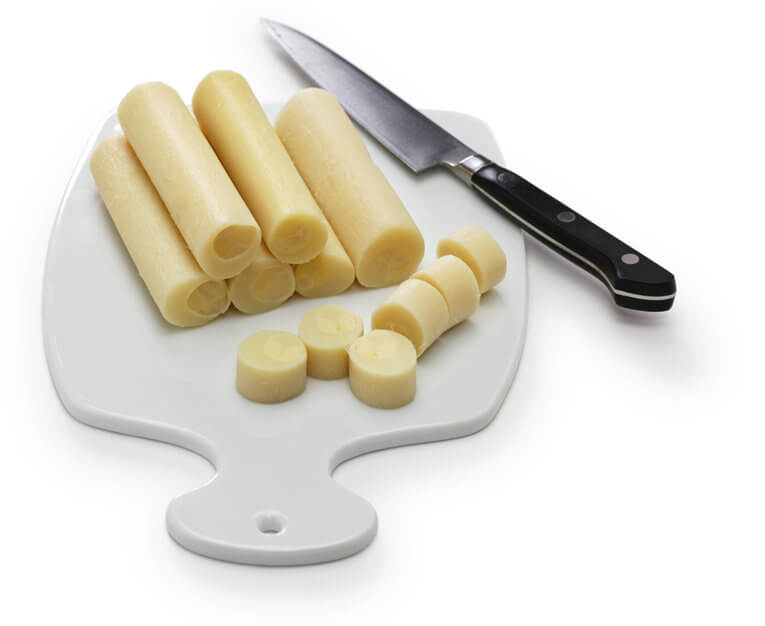Hearts of palm are one of the more obscure foods in the world of plant-based dieting, which is a shame because they’re tasty, versatile, and come packed with lots of nutrition. In this article we’ll be shedding light on some of the benefits of hearts of palm that you’ll enjoy when adding them to your diet.
In short, the primary benefits of hearts of palm include their rich vitamin C content, clocking in at 19% the Daily Value for a single 1-cup serving. Additionally, they contain fiber, iron, and various other minerals and electrolytes, including zinc and copper.
Let’s dig in deeper!
What Are Hearts Of Palm?
Hearts of palm are the edible center of certain palm trees — usually the coconut tree in most cases, but other varieties can be used as well. They grow natively in South Asia, South America, and anywhere else with a warm, tropical climate.

One of the greatest benefits of hearts of palm is that their harvesting process is actually quite sustainable, as only a few palms need to be cut down to provide an ongoing supply of this vegetable. In fact, some farmers have even developed methods of growing palms specifically for the harvest of their palms.
They are usually canned or jarred and can be found in the International aisle of most grocery stores. Alternatively, they can be purchased fresh (if you can find them) and can be eaten raw or cooked.
How They’re Consumed
Hearts of palm tend to be consumed in South Asian and South American cultures. They are commonly mixed in with salads, but they can also be eaten by themselves as a snack or side dish.
The canned/jarred variety are softer and more tender than they are in their raw state.
When fresh, they can be eaten raw, but they may be crunchier and have more of a coarse texture.
It should be noted that the canned/jarred variety of hearts of palm tend to be high in sodium. This is done to preserve freshness and extend the shelf life of the product.
What Do Hearts Of Palm Taste Like?
If you’ve never had hearts of palm before, you’re in for a treat!
They have a mild and earthy flavor that’s similar to artichoke hearts. Sometimes dressings and seasonings are added for flavor.
When eaten raw, they have a crisp bite, but can become tender when boiled, fried, or baked.
Hearts of palm are incredibly versatile and can be used in a wide variety of dishes.
Nutrition Facts
Let’s have a look at the nutritional contents of hearts of palm. The following is the nutrition facts data for a 1-cup serving of canned hearts of palm:
- Calories: 40.9
- Total Carbohydrates: 6.7g
- Total Sugar: 0g
- Dietary Fiber: 3.5g
- Total Fat: 0.9g
- Protein: 3.7g
- Sodium: 622mg
- Potassium: 258mg
- Vitamin C: 19% DV
- Iron: 25% DV
- Magnesium: 14% DV
- Zinc: 11% DV
- Copper: 10% DV
Hearts Of Palm Benefits
Now that you’ve been briefed on the almighty heart of palm, let’s go over some of the benefits to be enjoyed when adding them to your diet.
1. Loaded With Fiber
Fiber is an indigestible carbohydrate that removes waste from the body, among other things. It’s been shown to promote regularity, lower cholesterol levels, and aid in digestive health, according to Mayo Clinic.
A 1-cup serving of hearts of palm contains 3.5 grams of fiber, which is 14% of the Daily Value (DV). Most people who consume foods that are highly process tend to be lacking in fiber intake. Adding hearts of palm to the mix can help get you closer to reaching your goals.
2. Packed With Vitamin C
If you’re looking for a food that’s high in vitamin C, look no further than hearts of palm! A single 1-cup serving contains 10% of the Daily Value for this important nutrient.
A powerful antioxidant that helps protect cells from damage, vitamin C also plays a major role in immune health as well as the absorption of iron.
3. Low Calories
Seeing as how hearts of palm are a whole plant food, they are naturally low in calories when compared with other processed foods.
Calories are the unit of measurement used to gauge energy consumption and expenditure in the body. In fact, a 2007 randomized control trial published to PubMed found that fat loss depends entirely on an energy deficit.
A cup of canned hearts of palm contains a meager 40.9 calories, making it an excellent choice for anyone seeking to reduce their daily caloric intake by consuming more satiating foods.
4. Keto-Friendly
One of the more surprising benefits of hearts of palm is that they can be compatible with a ketogenic diet when consumed in moderation.
A ketogenic, or “keto” diet calls for the restriction of carbohydrate intake so the body can produce ketones to be used for energy instead.
One of the downsides of a keto diet is that it’s often difficult to find keto-friendly foods that contain both fiber and vitamin C — something hearts of palm have in abundance.
5. Contains No Sugar
Hearts of palm are a great choice for people who may be looking to cut back their sugar intake as they contain virtually no naturally-occurring sugars.
This is good news for your blood sugar levels as well as your teeth, as excess sugar consumption has been linked to cavities and gum disease, among complications.
6. Low In Fat
Those seeking to reduce their intake of dietary fat will be happy to hear that hearts of palm are naturally low in fat, clocking in at only 0.9g per serving.
What’s more, hearts of palm have even less saturated fat, as well as a balanced ration of omega 6 to omega 3 fatty acids.
7. A Good Source Of Plant-Based protein
Protein is a hot commodity among the health-conscious in general — especially plant-based dieters.
Responsible for the growth and repair of muscle tissue (among other things,) protein can be found in hearts of palm to the tune of 3.7 grams per cup.
This may not seem like much, but when you take into consideration that it only costs 40.9 calories to obtain that quantity of protein, it’s pretty clear to see that hearts of palm are one of the highest protein vegetables on a per-calorie basis.
8. High In Iron
Iron is an essential mineral that the body needs to produce hemoglobin — a globular protein responsible for transporting oxygen in the blood. Iron deficiency is associated with anemia — a condition characterized by fatigue, weakness, and pale, yellowish skin, according to Mayo clinic.
A 1-cup serving of hearts of palm contains 25% of the Daily Value for iron — not bad for a plant-based food that’s often used as a salad topping!
9. Contains Electrolytes
If you’ve ever suffered from muscle cramps then you already know how excruciating they can be. Electrolytes like potassium and magnesium play an integral role in the contraction and relaxation of muscles.
Hearts of palm are a modest source of potassium, magnesium, and calcium; making them a great post-workout snack for anyone who’s looking to replenish their electrolyte stores. Just be mindful of the sodium content in the canned variety!
10. Minerals
Finally, we can’t discuss hearts of palm benefits without addressing the mineral content.
Minerals play various roles in the body — everything from supporting immune health to increasing bone strength and density.
Hearts of palm contain generous amounts of the following minerals:
- Iron
- Zinc
- Copper
- And more
The Bottom Line
By now it must be obvious that the benefits of hearts of palm are vast and wide. This article only scratches the surface.
For those looking for a lower-calorie way to boost their fiber and vitamin C intake, hearts of palm may be the solution to your problem.

